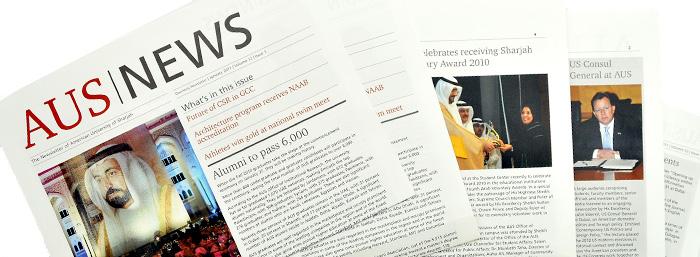- About
- Admissions
- Study at AUS
- Prospective Students
- Bachelor's Degrees
- Master's Degrees
- Doctoral Degrees
- Admission Publications
- International Students
- Contact Admissions
- Grants and Scholarships
- Sponsorship Liaison Services
- Testing Center
- New Undergraduate Student Guide
- New Graduate Student Guide
- File Completion
- New Student Orientation
- Payment Guide
- Executive Education
- Students with Disabilities
- Academics
- Life at AUS
- Research
- Contact Us
- Apply Now
- .

AUS professor and alumna direct workshop at Gulf Research Center Cambridge University
An American University of Sharjah (AUS) faculty member and alumna have recently directed a workshop on Gulf cities at a research center at the University of Cambridge in the United Kingdom.
The workshop, directed by AUS alumna Sharmeen Syed, and Associate Professor at the AUS College of Architecture, Art and Design (CAAD), George Katodrytis, was entitled "Gulf Cities as Interfaces." It was held at the Gulf Research Center Cambridge, which is part of the Centre of Islamic Studies at the University of Cambridge.
The workshop explored the factors and forces that generate the physical and socio-economic aspects of Gulf cities: cities that have resulted from rapid mobilization, exponential urban growth, and a very specific wave and adaptation of globalization processes.
According to Katodrytis, "Our workshop looked at cultural identities as well as local interconnectivities and global projections of various cities including Jeddah, Salalah, Doha, Dubai, Abu Dhabi, Sharjah and Muscat. The workshop dealt with issues of urbanism, landscape, energy and farming. We looked at common trends as well as differences and we mapped ways to construct new practices of the future. These outcomes will be complied in a forthcoming publication."
The workshop was a collaborative effort to bring together various academics to discuss the contemporary Gulf city, in terms of architecture, urbanism and culture. AUS faculty members, Dr. Jerry Kolo and Adrià Carbonell, and alumna, Talin Hazber, also presented papers at the workshop.
The workshop was part of an annual Gulf Research Meeting (GRM) established by the Gulf Research Center Cambridge to enhance knowledge and research about the Gulf. The GRM aims at providing an academic environment to foster Gulf studies and to encourage academic exchange about the developments taking place that are defining the Gulf region. It was part of a series of workshops selected following a submission of proposals and 16 papers were presented. About 300 delegates participated in the workshops.

